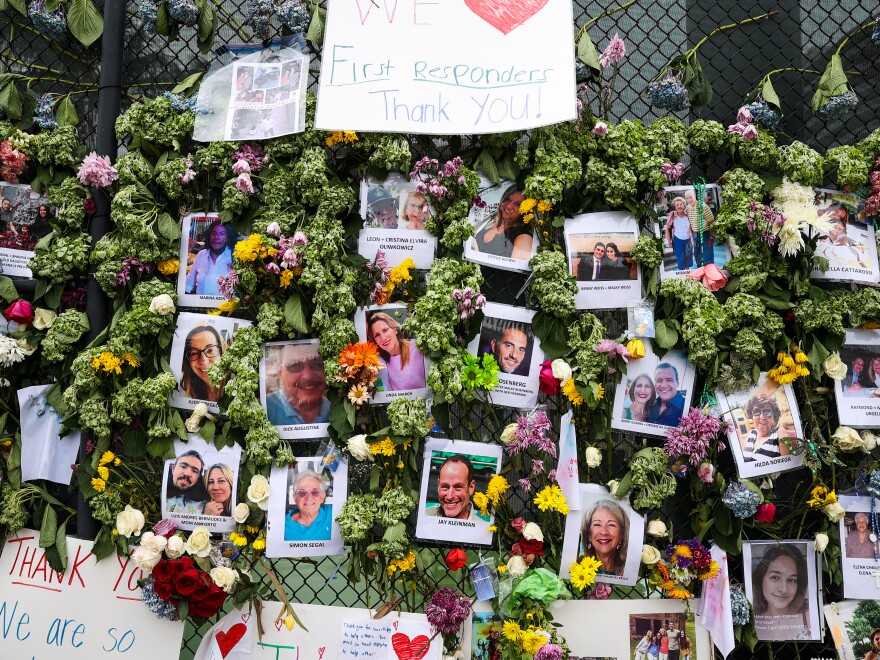A judge in Miami has given his initial approval to a deal that will exceed $1 billion for the families of the 98 victims who died in the Surfside condominium building collapse.
The ages of the 98 victims ranged from 1 to 92 years old — and their age at the time of the Champlain Towers South collapse will play a huge role in deciding how much money their families will get.
For instance, the settlement amount would be higher for a victim who was their family’s sole provider "than, say, a very elderly person who was no longer working and no longer supporting a family — not that it’s not a tragedy unto itself," said Brad Sohn, whose Coral Gables law firm filed the first class-action lawsuit after the collapse on June 24, 2021.
Eventually, the court-appointed him and many other attorneys to represent all of the victims.
WLRN is committed to providing the trusted news and local reporting you rely on. Please keep WLRN strong with your support today. Donate now. Thank you
Sohn says all of these deaths are equally tragic, but their lives won’t be valued equally by the court. The calculation takes into consideration who was left behind.
"Are the family members young children who are parentless, or are they adults who essentially are fully self-sufficient? Ultimately, any settlement amount or monetary award to a compensation fund is going to be driven by doing one's best guess at what a jury would be likely to award," Sohn said.
Kenneth Feinberg has made his best guess many times when he was the special master of the September 11th Victim Compensation Fund — for victims of the World Trade Center attack on Sept. 11, 2001.
He hosted nearly 1,000 hearings with family members to come up with an amount for them.
"And it was absolutely harrowing and it was very debilitating," Feinberg told WLRN. "I never got over it."
He says making distinctions based on earning potential — like, was someone a nanny or a banker?
"You promote the very divisiveness you're trying to avoid," Feinberg said about the process. "Calculating different values for each life is the majority view in every court in Florida, in every court in the nation — all lives are not equal."
When he did this work after the June 12, 2016, Pulse nightclub shooting in Orlando, he split the money equally among the families of the 49 victims because those dollars came from donations.
"All lives were valued the same because that money was a gift from the American people," he said.
In the case of Surfside, the money comes from a settlement that was reached to avoid a jury trial. Families will fill out forms, and if they want to, they may speak about their loved ones in court. Then the court will guess what a jury would have awarded each family, taking into consideration the differences in their situations.
After court recently, Pablo Langesfeld said it doesn’t matter how much money his family gets for the loss of his daughter, Nicole, because of the magnitude of their loss.
"There isn't a monetary value that would replace a life," he said in Spanish. "Regardless of how much money they give us, we will always have a big wound."
Langesfeld said the only thing he wants is to know why the building collapsed. A federal investigation by the National Institute of Standards and Technology continues into what caused this disaster.
Pablo Rodriguez dreads the process of filling out forms about his mom, Elena Blasser, and grandmother, Elena Chavez, who both died in the collapse.
"Just the thought that there’s gonna be a group of people sitting there, trying to put a dollar value on my mom, on my grandmother — to me is not only absurd but a little bit insulting," he said.
He says siblings will then need to divide the money amongst themselves after the death of a mother, for instance, "to try to compensate anything for the fact that you can no longer see them ever again. It’s still a very long, drawn-out and heartbreaking process to go forward."
Rodriguez says he feels conflicted about the settlement because it comes with money but no accountability — no one is admitting fault.
Families who don't opt-out of this settlement are slated to receive their payments in September.






